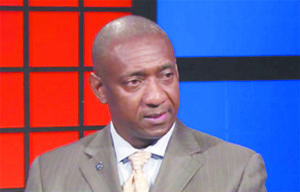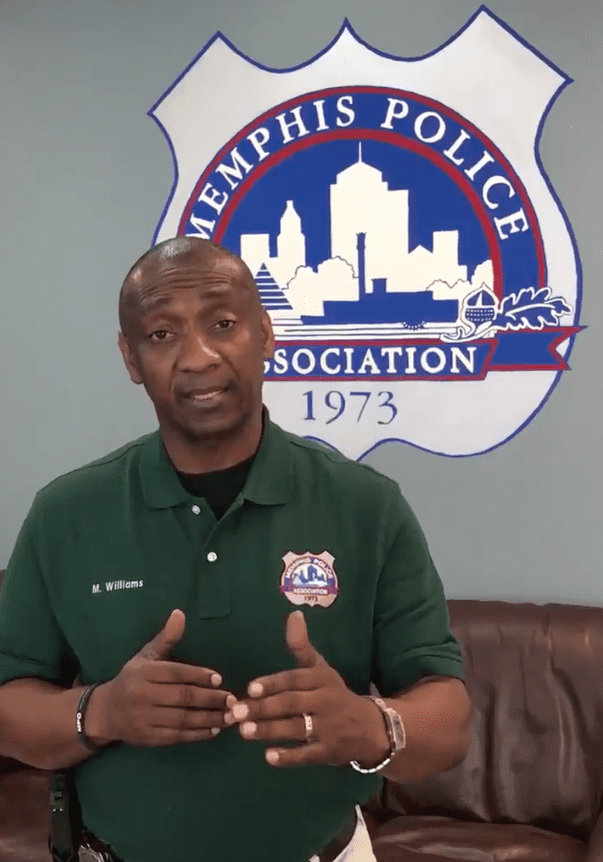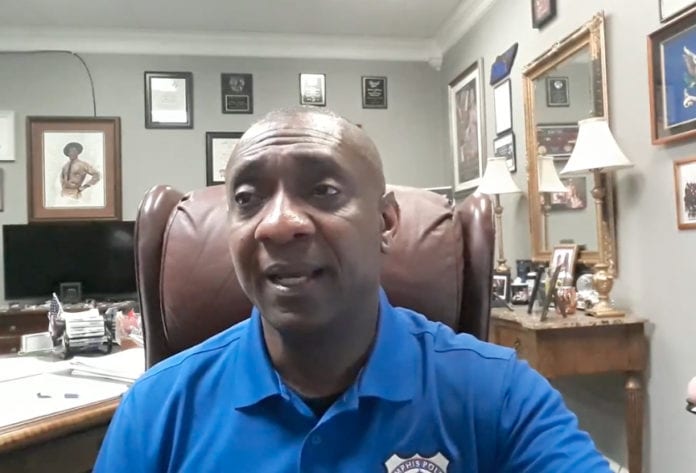For veteran Memphis Police Department officer Michael Williams, president of the Memphis Police Association, the burgeoning calls for conversations on police reform are warranted.
He simply thinks the discussions need to be in coordination with the police and not against them.
The actions of police officers and how they interact with the public are at the forefront of the nation’s and world’s consciousness because of the video-recorded killing of another unarmed African-America man, 46-year-old George Floyd.
Floyd died as a result of a Minneapolis Police Department officer holding a knee to Floyd’s neck for eight-plus minutes while three other officers stood by.
Protests about the homicide – and a string of other incidents of unarmed African-American men and women being killed by police officers in various parts of the country – continue to fuel protests against police brutality and demands for change throughout the United States, including Memphis.
Williams, who said he knows what it means to be a black man in America, has denounced the acts of the officers in Minneapolis, but emphasized the stark differences in Memphis compared to other cities across the country.
Talking to The New Tri-State Defender, Williams spoke candidly about talks of defunding police departments and what can be done to enhance the relationship between citizens and law enforcement.
The New Tri-State Defender: Police reform is a prevailing topic right now, in light of the death of George Floyd. We’ve seen protests throughout the country and here in Memphis. Do you think there is a need for police reform in this city?
Michael Williams: There can always be a need to make things better. The police serve the community and we work for the community. So, I think that if the community feels there is a need for reform and policy change, I am not opposed to reform. However, I think that they need to work in conjunction with the police so that it won’t jeopardize the lives of the officers or the citizens.
TSD: In addition to reform, there have been talks of defunding the police. Monday, Shelby County Commissioner Tami Sawyer proposed budget cuts to the Sheriff’s Department in an effort to reallocate those funds to community initiatives. While that proposal was defeated, there have been other elected officials and community leaders who have also called for defunding the Memphis Police Department. What’s your take on defunding?
Williams: Once I did more research, what I found out is that what they are saying is that the Police Department in Memphis and Shelby County have the biggest budgets and they can sustain some cuts and then funnel that money into community activities for the youth.
I get it. But the problem that I have with that is that the police are going to have the biggest budget because the police are the biggest division in the city of Memphis. The other thing is that you’re talking about paying for quality law enforcement services.
The individuals put their lives on the line as police officers, and they should be paid commensurate.
The other issue that I have is that with what they’re trying to do — they’re looking in the wrong places when it comes to putting money back into the community.
TSD: Where are you suggesting that they look when talking about reallocation of funds?

Williams: We have to prioritize where our money is going. When you look at Memphis in comparison to other cities, we are giving sometimes ten times as much in pilots to these companies to do business here. That could be money from people’s tax dollars that can be funneled to the community.
So, we have to prioritize where this money is going because the citizens deserve quality core services — be in community centers, computer labs, or programs — because those are the types of things that assisted me in being able to uplift my life when I was younger.
I come from meager beginning and there were a lot of community programs and projects that actually helped me get out of North Memphis, where I grew up at in the 60’s and 70’s. So, I understand what some are talking about, but I think they’re looking in the wrong places.
There is room for them to look a little bit deeper — and now that they are on the City Council and County Commission — they can look for initiatives to be able to fund some of the things they are talking about.
TSD: While some people are talking about decreasing the police budget, others around the country have mentioned dismantling police departments altogether. What would you say to those who want to explore that option in Memphis?
Williams: Absolutely not. Because Memphis is listed as the second most violent city in the nation and we already have a problem with crime.
And, even when talking about defunding the police – now you’re talking about cutting the number of police officers when we are already down from 2,500 to 1,900. So, this already puts police into a role where they are reactive as opposed to proactive.
And that will mean cutting services at 201 Poplar. And they’re already hollering about living conditions and all of that at the jails.
Then there is the coronavirus that’s going on, so they are incurring additional costs for healthcare for inmates. So, do I think you should take millions from the Sheriff’s Department?
No, I do not. And that’s not because I’m a police officer. It’s because I’m an informed citizen.
TSD: Are you concerned about the rhetoric of defunding and dismantling the police department? You mentioned that the citizens should work in collaboration with police. Do you think conversations of dismantling may interfere with collaborative police reform efforts?
Williams: We’re playing checkers, most people are playing chess. There is a consorted effort by some to carry out some agenda items other than what the black community is looking at.
When you look at some of these marches, I see members of Antifa and communist flags. Somebody is funding these paid activists to go from city to city to push someone’s agenda. Some people are opportunists and using this… Mr. Floyd’s death as an opportunity to capitalize and push their agendas.
TSD: Some people have accused police associations with defending alleged bad behavior of officers. We’ve seen that in Minneapolis when the president of that association condemned other officers and even the city’s mayor for not standing with Derek Chauvin, the man accused of killing Mr. Floyd.
How do you balance advocating for police officers’ rights – one of the purposes of the association – and condemning bad behavior?
Williams: I don’t defend wrong. In Memphis when I got into the police association, I tried to rebrand it.
One of the things I stand on is my integrity. I’m going to fight at the council. I’m going to fight for the citizens of this community and, at the same time, I fight for the police officers.
I fight for their benefits. I fight for their rights. Sometimes people tend to think that police officers don’t deserve due process. The police officers are human and deserve an attorney. And that’s something that we provide them if it’s something related to their conduct on duty.
We provide them with the ability to be able to advocate for equal pay for benefits for health insurance.
We not only help the Police Department, but through the Memphis Police Association Charitable Foundation we’ve put almost 2 million dollars back into the city of Memphis.
TSD: In what ways?
Williams: We have police officers who are working in the community with football, baseball and basketball teams. And they’ve been doing it for some time but weren’t getting the funding, so we developed the foundation.
The foundation is to help and assist with different initiatives in the community and schools.
We have a lot of officers who are like me and who are from Memphis. We are more vested in the community here.
TSD: How would you describe the police and community relationship here in Memphis and Shelby County?
Williams: I can’t speak for Minneapolis or Texas or anywhere else. The deal with Breonna Taylor didn’t happen here in Memphis. George Floyd didn’t happen here in Memphis. The deal with the young man in Georgia didn’t happen here in Memphis.
And so, I always ask people when was the last time someone was needlessly killed by police here in Memphis? And some will want to say Brandon Webber but then I go, “No, hold up.”
He was actually an individual who had carjacked somebody and shot the man five times, and supposedly tried to run over and shoot at the U.S. Marshalls… then after I explain all of that, I still have to tell them that Memphis Police officers were not involved.
So, when was the last time MPD did something to that magnitude that you wanted to stand up and jump up and down about? And they really can’t tell me anything.
TSD: As a police officer and a black man, is it difficult balancing the woes associated with racial inequality while also fighting for police rights?

Williams: As a man of color, I have been discriminated against and felt the pressures of the world. Being a police officer is my occupation, but when I get home and take off my clothes and look in the mirror, I see a black man. When I look at my kids, I see black children.
And it hurt me to the core of my soul when I saw Mr. Floyd, a black man killed on national TV. Anybody who thinks that’s okay, there is something wrong with them. But, but even though there may be things I don’t always agree with, I don’t think all police are bad. Yes, there are bad police officers just as there are bad reporters, doctors, lawyers, teachers, preachers and politicians. There are bad people in every profession, but I don’t see that particular problem with police officers here in the Memphis.
TSD: Emotions are high and protests calling for police reform have continued for weeks now. As a police officer, what do you hope comes from these conversations and protests?
Williams: Before this, the pendulum was over on the right and then everyone said the police have too much power and the unions have too much power.
Now the pendulum is all the way to the left. Neither one of those is going to work. But hopefully once all of the emotions die down and everybody starts thinking again, hopefully there will be a happy medium that everyone can come to.
TSD: With that being said, are you optimistic about the potential of a better relationship between citizens and law enforcement in Memphis, and even across the country?
Williams: I think it’s an opportunity for that. And it’s always going to be alright. You have to go through the storms sometime to get through the promise land. This is the storm. I’ve been through the civil rights marches in the 60’s. I’ve been in combat in the military. But I’m still standing.



